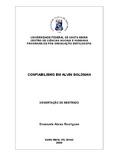| dc.creator | Rodrigues, Emanuele Abreu | |
| dc.date.accessioned | 2009-12-23 | |
| dc.date.available | 2009-12-23 | |
| dc.date.issued | 2009-08-26 | |
| dc.identifier.citation | RODRIGUES, Emanuele Abreu. Reliability in Alvin Goldman. 2009. 108 f. Dissertação (Mestrado em Filosofia) - Universidade Federal de Santa Maria, Santa Maria, 2009. | por |
| dc.identifier.uri | http://repositorio.ufsm.br/handle/1/9081 | |
| dc.description.abstract | We assume that the central focus of epistemology is propositional knowledge (S knows that P). However, since some true beliefs are true by accident, the central question raised by epistemologists is: What becomes a mere true belief into knowledge? There are several answers to this question, many of them conflicting with each other. Among the answers we find two perspectives that compete
with each other as the necessary and sufficient conditions for knowledge, namely, the internalist and externalist perspectives. For the epistemological externalism mind the external factors in the formation of belief. The research aims to discuss some issues that connect externalism a proper way of thinking about truth and what we do when we take a belief to be true. The theoretical discussion will use the externalist perspective of Alvin Goldman seeking a normative theory of justification, assuming that a
belief is caused by a reliable process. Goldman, for example, states that the explanation of justified
belief is necessary for knowledge and is closely related to it. Asserts that the term "justified" is an
evaluative term and any correct definition or synonym for "justified" would also be an evaluative term.
Thus, Goldman seeks a normative theory of justification for such a search to specify the conditions for
substantive epistemic belief. However, he said conditions should be a non-epistemic, that is, necessary and sufficient conditions that do not involve any epistemic notions. Goldman complains that most of the time it is assumed that someone has a justified belief because that person knows that the belief is justified and know what is the justification. This means that justification is an argument or a set of reasons that can be given in favor of a belief, but it just tells us that the nature of justified belief with regard to what a person might say if asked to defend or justify belief. Instead, Goldman thinks that a belief is justified only by some process or property that makes it justified. | eng |
| dc.format | application/pdf | por |
| dc.language | por | por |
| dc.publisher | Universidade Federal de Santa Maria | por |
| dc.rights | Acesso Aberto | por |
| dc.subject | Conhecimento proposicional | por |
| dc.subject | Justificação | por |
| dc.subject | Confiabilismo | por |
| dc.subject | Processos confiáveis | por |
| dc.subject | Alvin Goldman | por |
| dc.subject | Propositional knowledge | eng |
| dc.subject | Justified | eng |
| dc.subject | Reliabilism | eng |
| dc.subject | Truth worthiness | eng |
| dc.subject | Alvin Goldman | eng |
| dc.title | Confiabilismo em Alvin Goldman | por |
| dc.title.alternative | Reliability in Alvin Goldman | eng |
| dc.type | Dissertação | por |
| dc.description.resumo | Partiremos do pressuposto que o foco central da epistemologia é o conhecimento proposicional (S
sabe que P). Entretanto, uma vez que algumas crenças verdadeiras são verdadeiras por acaso, a questão central formulada pelos epistemólogos é a seguinte: O que converte a mera crença verdadeira em conhecimento? Existem diversas respostas para essa questão, muitas delas conflitantes entre si. Entre as respostas encontramos duas perspectivas que competem entre si quanto às condições necessárias e suficientes para o conhecimento, a saber, as perspectivas
internalista e externalista. Para o externalismo epistemológico importam os fatores externos na formação da crença. A pesquisa procura discutir algumas questões que conectam o externalismo a uma adequada maneira de pensar sobre a verdade e o que fazemos quando tomamos uma crença
como sendo verdadeira. Como referencial teórico utilizaremos a perspectiva externalista de Alvin Goldman que busca uma teoria normativa da justificação, pressupondo que uma crença é originada por um processo confiável. Goldman, por exemplo, afirma que a explicação da crença justificada é necessária para o conhecimento e está intimamente relacionada a ele. Assevera que o termo justificada é um termo valorativo e qualquer definição correta ou sinônimo de justificada seria
também um termo valorativo. Assim, Goldman busca uma teoria normativa da justificação, para tal procura especificar as condições substantivas para a crença epistêmica. Contudo, afirma que tais condições deverão ser condições não epistêmicas, isto é, condições necessárias e suficientes que não envolvem quaisquer noções epistêmicas. Goldman critica que na maioria das vezes se assume que alguém tem uma crença justificada porque essa pessoa sabe que a crença é justificada e sabe qual é a justificação. Isso significa dizer que a justificação é um argumento ou um conjunto de razões
que podem ser dadas a favor de uma crença, mas isso simplesmente nos diz que a natureza da crença justificada diz respeito ao que uma pessoa poderia dizer se fosse solicitada a defender ou justificar sua crença. Ao contrário, Goldman pensa que uma crença só é justificada através de algum
processo ou propriedade que a torna justificada. | por |
| dc.contributor.advisor1 | Gallina, Albertinho Luiz | |
| dc.contributor.advisor1Lattes | http://lattes.cnpq.br/0750109262601371 | por |
| dc.contributor.referee1 | Sautter, Frank Thomas | |
| dc.contributor.referee1Lattes | http://lattes.cnpq.br/2804652028967760 | por |
| dc.contributor.referee2 | Sartori, Carlos Augusto | |
| dc.contributor.referee2Lattes | http://lattes.cnpq.br/6830220445412069 | por |
| dc.creator.Lattes | http://lattes.cnpq.br/0752179446931202 | por |
| dc.publisher.country | BR | por |
| dc.publisher.department | Filosofia | por |
| dc.publisher.initials | UFSM | por |
| dc.publisher.program | Programa de Pós-Graduação em Filosofia | por |
| dc.subject.cnpq | CNPQ::CIENCIAS HUMANAS::FILOSOFIA | por |


